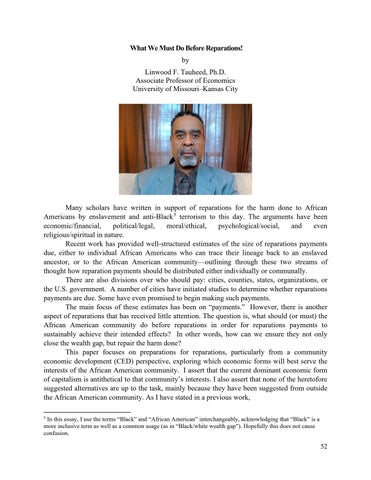What We Must Do Before Reparations! by Linwood F. Tauheed, Ph.D. Associate Professor of Economics University of Missouri–Kansas City
Many scholars have written in support of reparations for the harm done to African Americans by enslavement and anti-Black 5 terrorism to this day. The arguments have been economic/financial, political/legal, moral/ethical, psychological/social, and even religious/spiritual in nature. Recent work has provided well-structured estimates of the size of reparations payments due, either to individual African Americans who can trace their lineage back to an enslaved ancestor, or to the African American community—outlining through these two streams of thought how reparation payments should be distributed either individually or communally. There are also divisions over who should pay: cities, counties, states, organizations, or the U.S. government. A number of cities have initiated studies to determine whether reparations payments are due. Some have even promised to begin making such payments. The main focus of these estimates has been on “payments.” However, there is another aspect of reparations that has received little attention. The question is, what should (or must) the African American community do before reparations in order for reparations payments to sustainably achieve their intended effects? In other words, how can we ensure they not only close the wealth gap, but repair the harm done? This paper focuses on preparations for reparations, particularly from a community economic development (CED) perspective, exploring which economic forms will best serve the interests of the African American community. I assert that the current dominant economic form of capitalism is antithetical to that community’s interests. I also assert that none of the heretofore suggested alternatives are up to the task, mainly because they have been suggested from outside the African American community. As I have stated in a previous work, In this essay, I use the terms “Black” and “African American” interchangeably, acknowledging that “Black” is a more inclusive term as well as a common usage (as in “Black/white wealth gap”). Hopefully this does not cause confusion.
5
52

























